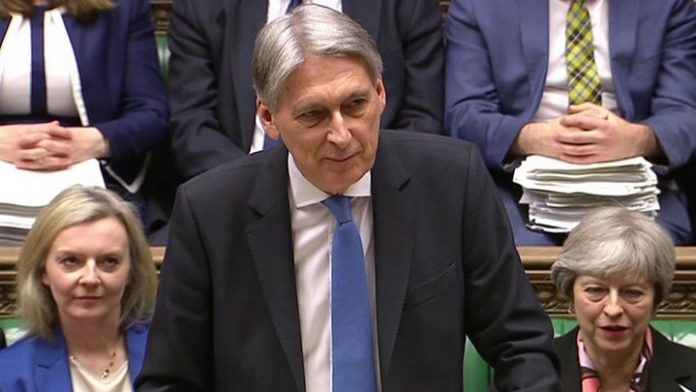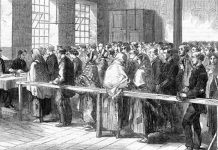Philip Hammond said a no-deal Brexit would mean ‘significant disruption’ to the economy with ‘higher unemployment, lower wages and higher prices in the shops’.
Giving his spring statement to the House of Commons, he said that making a deal would result in a ‘dividend’, which he hinted could mean spending increases and tax cuts totalling £26 billion.
The Office for Budget Responsibility (OBR) forecast that the UK economy will grow at the slowest pace since the financial crisis this year, cutting its 2019 growth forecast to 1.2%, the weakest growth rate since 2009.
The government is expected to borrow £22.8 billion this financial year,almost £3 billion lower than the £25.5bn predicted by the OBR in the October Budget.
Hammond also announced he was making an additional £100m available over the course of the next year to help deal with the surge in knife crime.
However The spring statement is being criticised for not providing more help to fight poverty and support poorer families.
The Joseph Rowntree Foundation meanwhile said that the benefits freeze continuing for another year will now leave families £560 worse off on average – equivalent to three months of food shopping for an average low-income family.
The Prime Minister also responded to a question about child poverty at PMQs by trying to deflect attention from rising poverty rates and onto workless households.
Campbell Robb, chief executive of the independent Joseph Rowntree Foundation said:
“The Government should have shown today that it is serious about tackling the rising tide of poverty in the UK. Instead they chose not to end the freeze on benefits leaving families in poverty to face rising costs and bear all the risks of economic uncertainty, especially if we leave the EU without a deal.
“When asked about rising child poverty earlier in the day, the Prime Minister tried to shift the focus onto the issue of workless households, suggesting a Government out of touch with the tough realities of many lives in the UK. In-work poverty is now rising faster than employment yet the Government has opted not to help the 3 .2 million children in low income working families who would benefit from an early end to the freeze.
“The Treasury has offered some funding on projects to tackle period poverty – but these are the symptoms of a bigger issue – poverty itself. Families in poverty have been cut adrift. The Government can buy itself time by asking to extend Article 50 – working families can’t get an extension to meet the essential.
Among other announcement, the Chancellor said that new homes will be banned from having fossil fuel heating systems from 2025 “delivering lower carbon, and lower fuel bills”.
Some announcements were welcome,
Phil Kemp, CEO, Bruntwood SciTech said
“The announcement that the Chancellor is to boost public spending on genetic research and laser technology by £200m is welcome news. Unlocking the growth of the science and technology sector in cities across the UK is vital for the future of our country’s economy in a post-Brexit era.
I am sure the £200m boost for the economies of Cambridge, Edinburgh and Oxfordshire will be the catalyst for further private sector investment and underpin the UK’s world-leading capabilities in life sciences, which already contribute some £70bn to the economy and support more than 240,000 jobs.
Sarah Longlands, Director of IPPR North responded by saying:
“In the midst of Brexit chaos, Westminster has once again left the North with little certainty about a future way forward.
“Forecasts for this year are fairly meaningless when the outcome of Brexit is still an unknown. Even if these can be relied upon, growth has been downgraded to 1.2% from 1.6% which will impact on wages, living standards and quality of life. This will have a direct impact for the North of England.
“We need the resources and the powers to be able to mitigate the risks of Brexit for people in the North, yet the Chancellor failed to mention the devolution framework or the Shared Prosperity Fund once in his statement.
“The North cannot wait for Central Government to provide certainty for Northern economies. The government must devolve power and resources to places like the North, so that we can plan for our own future and realise our own potential”.







